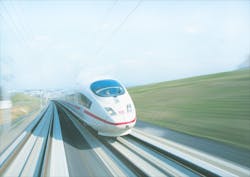Energy-Efficient Transportation Systems – Moving Forward in the German and the U.S. Transportation Sectors
Over the past years and decades, we have witnessed a global trend from using automobiles towards favoring more environmentally responsible means of transportation, such as public transit, biking and walking. Environmental awareness and the trend towards energy efficiency as well as major congestion problems in cities have resulted in a paradigm shift in the transportation sector.
While the extent of that shift varies from country to country, Germany is one of the most advanced countries in this field. Germany brings a lot of experience to the table in the transportation sector and provides an extensive, efficient and attractive regional and urban public transit network. Furthermore, Germany’s cities offer extensive bike lane networks, bike share programs and livable streets that allow for safe walking.
Germany has managed to improve its public transportation system by reducing costs and increasing efficiency all while keeping customer service one of their top priorities. Germany owes this achievement mostly to recent IT innovations – so called smart technologies, such as real-time information available for passengers at most stations and through electronic devices, bus tracking systems, operation optimizing software solutions, as well as innovative ticket sales applications.
Mode share numbers in Germany demonstrate how successful the transportation system is. In cities such as Berlin, Hamburg, and Munich, more than 20 percent of the population uses public transit, more than 30 percent walk, 10 percent bike and less than 40 percent use automobiles. When it comes to road traffic, Germany is also making advances with solutions such as more energy efficient vehicles, alternative fuels, car-free pedestrian areas, extensive bike lane networks, successful bike share programs, and smart road pricing solutions.
For the U.S. transportation sector, current developments predict that America’s love affair with the car is slowly coming to an end as well. This is certainly true for metropolitan areas. More and more cities support the implementation of public transit systems, extensive bike lane networks, and walkable neighborhoods. In addition, the national passenger rail company Amtrak experienced a record high in terms of ridership in 2012 and freight companies try to make freight transportation more efficient and green. At the same time, more and more cities use alternative fuel vehicles for their fleets and public transit agencies try to improve their services.
In order to combat congestion problems and to solve the funding gap for infrastructure, highway operators start implementing toll roads and other road pricing concepts. Furthermore, the implementation of IT components becomes an important element in the transportation sector for a higher service quality and a more efficient operation.
Most of these developments that are fairly new to the U.S. are already long established in Germany with its state of the art infrastructure system. The U.S. can now take advantage of this long-year expertise of German companies and decision makers in the transportation field. GACC Midwest, a key facilitator in fostering transatlantic business cooperation, aims at fueling an extensive and unique knowledge exchange between these two countries by connecting their stakeholders in the transportation sector and exploring the synergies for innovation and investment.
To further elaborate on current energy efficient and innovative technologies in Germany, GACC Midwest is bringing a German delegation of six companies in the transportation sector to Chicago from May 12-16.
The delegation companies are:
- IVU Traffic Technologies AG - IT solutions for all areas of public transit operations to improve efficiency, punctuality and reliability
- IS Predict GmbH – Software solutions for optimizing rail logistics
- ESM GmbH - Software solutions for demand responsive transport
- AdKor - Fuel cells for railway switches or highway toll stations
- Photon AG - Manufacturer of laser beam welded roofs and side walls for train cars and locomotives
- DB Systel – Service provider for information and communication technology for the rail industry
In addition, GACC Midwest will host a business conference on Energy Efficient Transportation Systems on May 13, 2014 where these companies will present solutions to current transportation issues.
In addition to the German delegates, experts in the transportation industry from both sides of the Atlantic will discuss current and future market trends as well as new innovations. Expert speakers from the Innovation Centre for Mobility and Societal Change, Chicago Metropolitan Agency for Planning (CMAP), Chicago Transit Authority (CTA), Fraunhofer Institute for Transportation and Infrastructure Systems, and the Metropolitan Planning Council will elaborate on present and future developments in the transportation sector.
Petra Stieninger is senior manager of government projects for the German American Chamber of Commerce of the Midwest Inc. The organization will hold the Energy Efficient Transportation Systems Business Conference will take place on May 13, at the University of Chicago Gleacher Center.
About the Author

